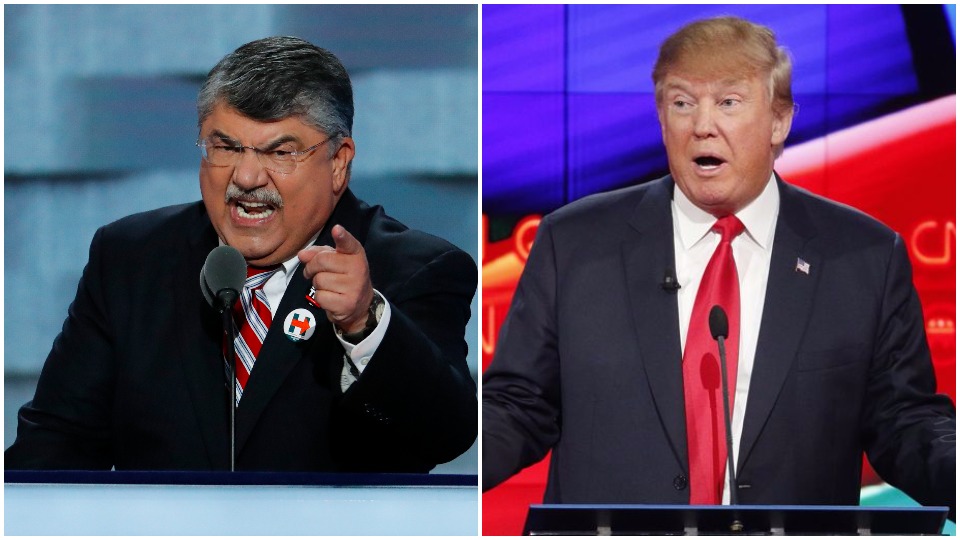
WASHINGTON—With U.S.-Mexico talks on a “new NAFTA” hearing up—and facing a deadline to send a pact to Capitol Hill—union leaders met President Donald Trump at the White House on August 21 to warn him against making a bad deal.
AFL-CIO President Richard Trumka led the delegation, which included Steelworkers President Leo Gerard. Trumka issued a warning flag for Trump in advance, and the others stayed mum. The AFL-CIO communications staff did not return either a call or an e-mail seeking names of other participants.
“NAFTA has wreaked havoc on our families and communities for decades,” Trumka said before the union leaders met Trump. “Renegotiation is a massive undertaking that must be done with care and precision in order to create jobs and raise wages. From what we have seen up to this point, it is clear this administration has made some progress, yet there is more that must be done.”
“We are meeting with the president to reaffirm what a good deal for working people really looks like, starting with strong workers’ rights backed up by effective enforcement tools unlike those that have failed in that past and led to the unrelenting outsourcing of work to Mexico, eliminating corporate courts and new rules of origin that are fair to America’s workers,” he added.
The pact must also have “a sunset provision to ensure these changes work for working people,” Trumka said. That’s a sticking point for Canada—and for corporate interests now pushing “new NAFTA” hard.
“The labor movement has a plan to fix NAFTA, and working people have told us they will not settle for anything less. We will be closely reviewing the final text as soon as it is available,” Trumka concluded.
Trump’s trade negotiator, Robert Lighthizer, has been in talks for three weeks with Mexican negotiators over a “new NAFTA.” Key issues appear to be domestic content on cars and limits on U.S. exports of farm goods to Mexico. Worker rights went unmentioned in various reports on the U.S.-Mexico talks.
The third partner in NAFTA, Canada, has been left on the sidelines.
Both the U.S. and Mexico appear to be rushing to complete a “new NAFTA” to replace the 24-year-old pact, which the George H. W. Bush and Bill Clinton administrations passed over strenuous labor objections and lobbying.
Workers and their allies forecast the current NAFTA would cost tens of thousands of jobs and subsequent studies proved them right: Companies relocated between 700,000 and 1 million jobs, from Oreo cookie and Ford car factories to newspaper call centers, south of the border. There, workers earn pennies an hour and have few rights.
Now Trump wants to send the new NAFTA to Congress before Labor Day, otherwise it would get pushed into the incoming Congress—where pro-worker forces could conceivably take over the U.S. House, noted worker ally Lori Wallach, a former trade lawyer who heads Public Citizen’s Trade Watch.
And Mexican President-elect Andrés Manuel López Obrador, the first progressive president in almost a century, wants to put the talks—and responsibility for any new NAFTA—on lame-duck President Enrique Peña Nieto. The latter’s Institutional Revolutionary Party (PRI) works hand-in-glove with Mexican oligarchs to suppress wages and workers’ rights.
Trump, Lighthizer, and Mexican Economy Minister Ildefonso Guajardo, a Peña Nieto cabinet member, have not only left the Canadians in the dark, but the U.S. Congress, too.
A month ago, Rep. Rosa DeLauro, D-Conn., a pro-worker leader in Congress on trade issues—and one of Capitol Hill’s best nose-counters on votes—joined Machinists official Owen Herrnstadt and other lawmakers in reiterating where labor and its congressional allies stand on any new NAFTA.
“The IAM and other members of Congress are demanding an end to outsourcing by fighting for strong, enforceable labor standards within a renegotiated NAFTA,” the union said in a statement. “Low wages, a lack of independent unions, and an inability for workers to collectively bargain in Mexico have led to the outsourcing of good-paying American jobs to Mexico and low wage growth.”
“IAM members know how important trade is to our jobs and to our economy” said Herrnstadt, the Machinists’ Chief of Staff and Director of Trade and Globalization. “After all, IAM members produce, manufacture, service, assemble, and transport the goods that make up the global economy. IAM members know when trade works, and IAM members know when trade doesn’t work.”
Meanwhile, Canada may be frozen out of the U.S.-Mexico “new NAFTA” talks, but Canadians appear not to mind. A check of the websites of both the Canadian Labour Congress—their equivalent of the AFL-CIO—and Unifor, the union which represents Canadian auto workers, disclosed no recent statements on the new NAFTA.
Last year, Canadian Prime Minister Justin Trudeau at first put a change in U.S. worker rights—repeal of right to work laws—on the table, but he’s been notably silent on that ever since. And the latest public opinion poll in Canada showed 55 percent of 1,227 adults surveyed will support a new NAFTA deal only if it requires making only moderate or minor concessions to the U.S., compared to 11 percent backing major concessions.
Trump and Lighthizer apparently believe they can force Canada into accepting whatever the U.S. and Mexico come up with—at least according to the dialogue in a Cabinet meeting before the U.S. union leaders arrived.
“We’re not negotiating with Canada right now,” said Trump. “Their tariffs are too high, their barriers are too strong, so we’re not even talking to them right now. But we’ll see how that works out. It will only work out to our favor.”
“I’m hopeful with Mexico, and then I hope once we get one with Mexico that Canada will come along,” Lighthizer replied.












Comments